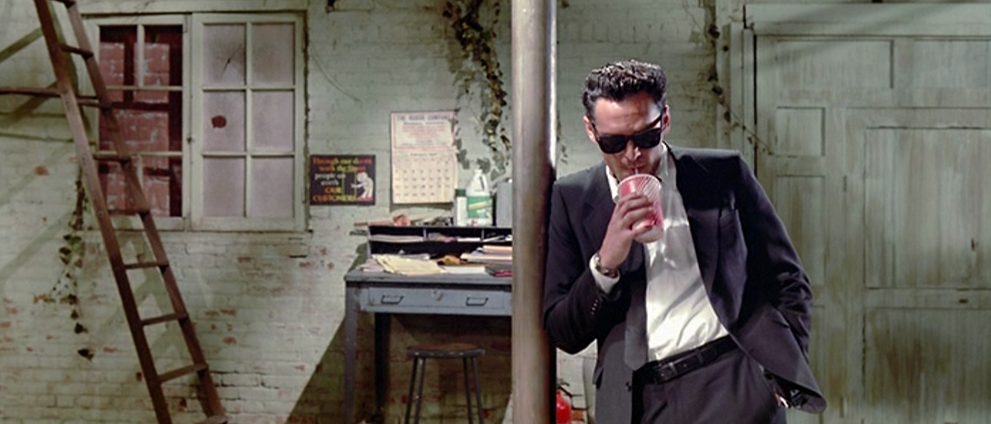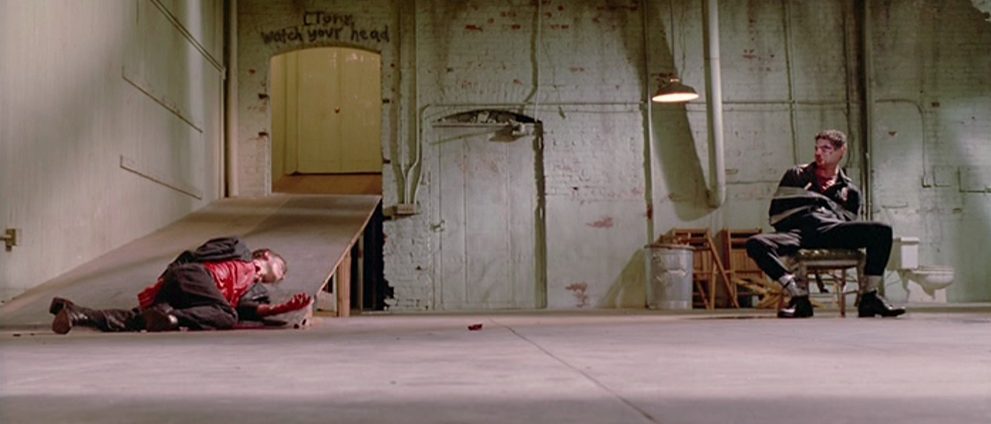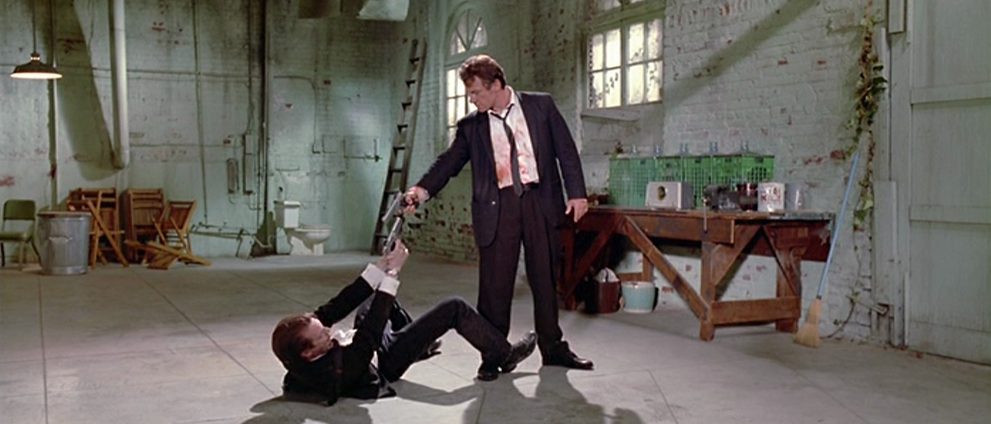

“Are you gonna bark all day little doggie? Or are you gonna bite?”
Reservoir Dogs suggests the filmmaker that Quentin Tarantino was to become to such an extent that we might as well say that he arrived fully formed. Everything’s here: the incidental conversations, the pop culture references, the quotations of older films, the nonlinear storytelling, the silly names, the fetishization of objects, the bold integration of pop music, the dark humor, the use of gleeful violence and gore, the rampant profanity, the visual dynamism. All at once he wears his influences on his sleeve and crafts a fresh experience that would become a touchstone of independent cinema.
The film centers on a gang of veteran mobsters (Harvey Keitel, Tim Roth, Michael Madsen, Steve Buscemi, Eddie Bunker and Tarantino himself), all working under color-coded aliases for a kingpin (Lawrence Tierney) and his son, Nice Guy Eddie (Chris Penn), who, in the wake of a botched diamond heist, hole up at the proposed rendezvous in a warehouse and bicker over who among them is the rat. Two robbers were killed during the shootout at the jewelry store and another lays gutshot and dying while various conflicting accounts are laid out Rashomon style. Trigger fingers remain poised as the survivors work through their suspicions and question their loyalties.

The opening pre-credits sequence is rightly the stuff of legend: the eight criminals, huddled up in a diner the morning of the job, cracking jokes, teasing each other, discussing the ethics of tipping, and analyzing the meaning of Madonna’s ‘Like a Virgin’. It’s immediately arresting as the camera dances around the periphery when the banter is amusing and switches to conventional shot-reverse-shot when Joe (Tierney) gets angry. It’s so striking, in fact, that ten minutes go by in the blink of an eye, at which point you realize you’ve become totally engrossed in a gangster movie that’s been nothing but eight guys shooting the breeze like in a George V. Higgins novel.
Therein lies the real pull of Reservoir Dogs. Sure, Tarantino’s handling of music, his blocking, his choice employment of slow motion, and other such things, reveal the man to be a natural filmmaker. But it’s certainly the case that the real meat and potatoes of the film is its off-center characters and their snappy dialogue, which is saturated with pop culture references—Pam Grier, Charles Bronson, The Fantastic Four, The Great Escape, Marlon Brando, Doris Day, Lee Marvin, The Wizard of Oz, and so on—that bridge the gap between these swaggering gangsters and the audience.

It is particularly nifty when it turns meta. Consider that in amongst its deconstructions of Madonna lyrics and its offhand callouts to pop culture icons, Reservoir Dogs comments on the very nature of acting itself when Officer Holdaway (Randy Brooks) coaches the undercover cop. “You have to be naturalistic as hell,” he says. But of course, however invigorating Tarantino’s dialogue, it is not naturalistic in the slightest.
As Josh Larsen points out in his review, it’s actually quite glib, which keeps the audience at a considerable distance. I don’t necessarily agree with the examples Larsen gives—he dislikes the use of the forbidden racial slur and infamous torture of Officer Nash (Kirk Baltz) set to Stealers Wheel’s ‘Stuck in the Middle with You’—but the smooth wit and flamboyant language effectively render the characters as entirely fictional creations. They’re multi-layered and extremely well realized by the cast, but they are essentially amalgamations of genre caricatures culled from the director’s archives and implanted with knowledge of his own obsessions.

That Tarantino’s personality is so apparent throughout his script is only a problem, however, if you demand naturalism or realism. If, on the other hand, you jibe with his quirky tendencies and the blend of violence and pop, Reservoir Dogs is just a small taste of what the director’s oeuvre has in store. Filmed on a modest budget and scarcely promoted, it established a blueprint that Tarantino would refine throughout the rest of his career. It can feel a bit unpolished when set against his later films, but it still stands a one-eared head and shoulders above its imitators.